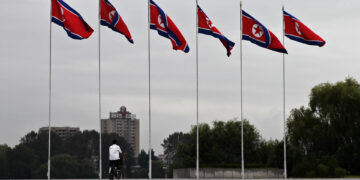April 9, 2024
Dropping the Cold War Framework in U.S.-China Competition

Rhetoric around U.S.-China relations in the past few years has frequently been framed as an unavoidable “New Cold War,” pitting the U.S. and its allies as the “democratic bloc” vs a China-led “autocratic bloc,” with Russia playing a supporting role for the latter.
However, it’s a term and a framework that both U.S. rhetoric and policy need to turn away from, as the Cold War is a poor point of comparison for today’s great power competition between the U.S. and China. Even the lowercase “cold war” understanding of bilateral competition will continue to be overshadowed by capitalized Cold War ghosts, especially considering that the term was coined to describe U.S.-Soviet relations specifically. If U.S. policymakers are trapped in an ill-fitting framework of historical memory, they will be more likely to recycle Cold War strategies, regardless of whether those strategies are the most effective means of promoting U.S. interests in the face of a rising China.
In the Cold War, the U.S. and the Soviet Union existed in almost entirely separate economic blocs, with little trade between them and certainly no economic interdependence. This left the two superpowers to focus their competition on military power and global spheres of influence. The U.S.-China situation looks very different, with a massive amount of economic interdependence between the two, despite efforts toward “decoupling.” Aggressive military posturing will therefore have very different consequences in this new era of competition. In attempting to hurt one another economically, the U.S. and China ultimately face mutually assured economic destruction and both regimes should be proceeding with more caution.
More on Asia

By John Mueller
April 10, 2025

Featuring Jennifer Kavanagh
April 2, 2025







